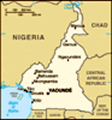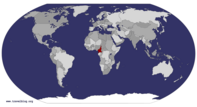Advertisement
Published: August 23rd 2011
On our last day in Yaoundé we visited a primate sanctuary in the national park of Mfou. To get there we called a number found in my Cameroon guide book. We didn’t really understand each other with the people in the other end, so after all we just agreed that someone English speaking would still call us back the morning after. By late next morning it was anyhow me who called the people again, but that was good because finally there was the park director in the phone, speaking perfect English and giving us instructions about how to get to the park and what it would cost. So everything seems to work out eventually, people can be so easy-going and helpful..! One just needs some patience and trust in things.
We went to the park by taxi. The driver misunderstood our instructions at first, because he tried to drop us off at the zoo in the city. He was then shocked as he finally understood we wanted to go 30km away from the center, to the national park. So he called his big brother, who eventually was the one to take us to the park. There was police guarding the
roads, the first time we got face to face with an official here. It took a chat, a few coins, showing our passports and a lot of smiles to continue on our way. However this was, I think, just a normal procedure..
The driver was great; he got us all the way and waited for us while we visited the primate sanctuary. It was so peaceful there, a few houses in the middle of the forest, some people, chicken and goats strolling along a small road. Our guide, Henry, showed us around. Animals are saved and brought there, from bushmeat markets especially, taken good care of and, finally, released into the wild when possible. They had chimpanzees, gorillas, mandrills, colobus and mangabey monkeys, baboons and a few other primates. The animals live with their own kind in big forested enclosures.
Henry knew a lot about bushmeat hunting, one of the issues they’re working on at the sanctuary and Ape Action Africa. The great apes and other monkeys in these rainforests are especially threatened by the trade for meat and pets. On top of evoking much compassion in humans because their being so alike with us, they are, like
many other species, important dispersers of fruits and seeds in the forest. And lots of the species are declining. Well, all in all, it’s something that always moves me, and hearing stories from Henry was interesting as well as useful for us. Since our arrival we continuously meet people who have something to say about the issues we’re looking at during our fieldwork, and that’s been amazing. One can read a great deal about a place before going there, but only on site does one get a real feel of the issues at stake.
I was also pleasantly surprised by the sign leading to the gorilla enclosure. On it were printed the words from Daniel Quinn’s book, Ishmael: “With man gone, what hope is there for gorilla? With gorilla gone, what hope is there for man..” It evoked me again thinking about the different ways of life that we could follow, and how different it is to look at it and the developments in society when seeing some of the African way of life of today, and the European way of life and ideologies that are dominating or arising there.
Many things seem to be so upside down
in a way… In Europe for example lots of people want to think we should live more modest lives in a sustainable way, using fewer natural resources. It’s kind of a general tendency these days, wouldn’t you say. Then somewhere in Africa or Asia it’s still less normal to think that way, but things like development and economic success are ultimately the things that people prosper and try to achieve, to be very simplistic. The amount of cars in Yaoundé for example; when seeing it, it’s hard to think that there’s any attempts to curb the growth of private driving. In Europe lots of attention is given to this, whether attempts succeed or not.
Then there are the peoples who really do live quite thoroughly off nature, in many corners of the world but also here in the rainforest, without much of those things that we have around us in our everyday life. Those people we could learn a lot from, and we have learned of course, but I wonder how long there will still be people like that. Hopefully and probably till far future. The “takers” and the “leavers”.. Such big contrasts in the ways of life, and in what things are valued at certain times by different people.
Another thing that goes weird ways is religion. We’ve been asked many times here if we belong to catholic, or protestant, or what kind of church.. it’s so normal here to be Christian. Some look astonished when we explain we might not believe or we believe in a bit different way. As our co-student here put it, the Europeans are crazy, they first came to Africa spreading Christianity to where ever they went, and now they stop believing. Well that is kind of true, and indeed rather funny. At least it makes you think, how on earth do these things change like this, in space and with time..
In any case, the text on the gorilla sign made me think about this side of species declines and extinctions, that with every species that is lost because of humans something inherently beautiful and precious is lost as well, things that can teach us about the essence of life. But it also has the more practical side, here in the forests of central Africa especially. With more and more people in the forests and in the cities, more roads being built, there is ever increasing pressure on wildlife from hunters as well. It’s a puzzle, such a normal thing as it is for many of these people to consume meat hunted from the forests.. when it gets too intense, there won’t be animals to hunt anymore. Around bigger cities and in the countryside, it’s clear that animals get scarcer. With predictions about these rainforests diminishing during the coming decades, it’s hard to think there could be much more than a fraction of the animals living here then that still reside here today.
Complex issues they are. It’s so often short term benefits motivating the people.. It can be much easier to gain an income by selling a bunch of monkeys to the trader who will give good money for it, and get even more in the city markets, than to try and get the same money by farming a piece of land. In Campo area there’s lots of potential for ecotourism, and that’s one of the things that could bring the needed income to the locals, by means of promoting eco-friendly travelling, spreading knowledge about the forests and their fauna, and creation of jobs that come along with these businesses. Bee-keeping is one of the other solutions that are researched and tried out in Cameroon and elsewhere, as an alternative to hunting, or illegal logging.
To me these things are something worth looking at and considering, and when I can do it in an area like this, really kind of working on something related to hunting, community-based conservation and rainforest fauna, it makes me very motivated and glad to be here. Still at the same time I’m a bit worried about how I’m received by the people, and how is it justified for me to do any sort of research project right here.. Oh well, worrying is not good for anyone, and luckily Linda is always there to make me see things in another light again. We’re here to learn and experience, to carry out a small piece of research and manage to present our findings literally and orally later on. Meanwhile, it’s allowed I think to enjoy the beauty of the surrounding, embrace the feel of the way of life here, and indeed, let my mind wander around these and other kinds of things in life.. that’s something I’ve always enjoyed, and am often a bit disappointed when I don’t seem to have time for it in my kind of busy student life.
Oh, the taxi driver totally ripped us off in the end of the trip. His brother’s child had just died, and then when he dropped us at the hotel, he looked quite miserable and I really felt for him.. So when he asked for higher price than originally agreed upon I was very “blue-eyed” as they say in Finland and gave him the money. It’s not like it was too expensive for us, and the guy obviously had a long and tough day, but still, keep going this way and I’ll end up paying way too much for everything.. It’s a small lesson for me to learn to be a bit stricter, and to recognize when the money is sincerely needed.
The story became very long again.. next time I'll tell more about our interviews! We'll start them tomorrow, so I'm very excited. However it might be a while before we have proper internet connection again.. we'll see.
Advertisement
Tot: 0.042s; Tpl: 0.011s; cc: 8; qc: 19; dbt: 0.0232s; 1; m:domysql w:travelblog (10.17.0.13); sld: 1;
; mem: 1.1mb









